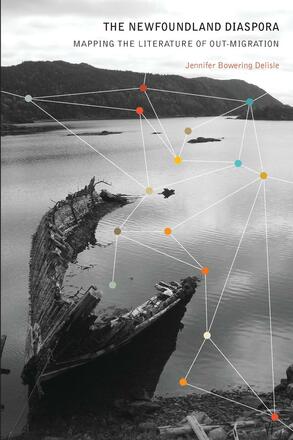
The Newfoundland Diaspora
Mapping the Literature of Out-Migration
Description
Out-migration, driven by high unemployment and a floundering economy, has been a defining aspect of Newfoundland society for well over a century, and it reached new heights with the cod moratorium in 1992. This Newfoundland “diaspora” has had a profound impact on the province’s literature.
Many writers and scholars have referred to Newfoundland out-migration as a diaspora, but few have examined the theoretical implications of applying this contested term to a predominantly inter-provincial movement of mainly white, economically motivated migrants. The Newfoundland Diaspora argues that “diaspora” helpfully references the painful displacement of a group whose members continue to identify with each other and with the “homeland.” It examines important literary works of the Newfoundland diaspora, including the poetry of E.J. Pratt, the drama of David French, the fiction of Donna Morrissey and Wayne Johnston, and the memoirs of David Macfarlane. These works are the sites of a broad inquiry into the theoretical flashpoints of affect, diasporic authenticity, nationalism, race, and ethnicity.
The literature of the Newfoundland diaspora both contributes to and responds to critical movements in Canadian literature and culture, querying the place of regional, national, and ethnic affiliations in a literature drawn along the borders of the nation-state. This diaspora plays a part in defining Canada even as it looks beyond the borders of Canada as a literary community.
Reviews
“Reading Delisle’s astute examination of select pieces of Newfoundland literature I felt more than once the desire to throttle some of the authors and characters she is analyzing—characters who resist giving up their Newfoundland driver’s license because it ‘was the last proof of who [they] were’ or argue a ‘Newfoundland soul’ can never be a ‘Canadian soul.‘ Reading such claims I wanted to grasp these characters by the shoulders and scream into their faces, ‘Give it up, b’y! Did you want to live down the road from mom and dad your entire life?‘ My own individual (and, I realize, defensive) reaction to these very personal narratives helps identify how tangly a topic Delisle has chosen to tackle in the ‘Newfoundalnd diaspora.‘ She does well to present a focused, important text that is at times passionate and intimate while at other times critical and distant. The Newfoundland Diaspora is a valuable text for those choosing to understand and challenge the applicability of postcolonial theory to Canadian literature.... Delisle ... makes the wise decision to not simply answer the question, ‘Is there a Newfoundland diaspora?’ Rather she ... replies with a question of her own: ‘what opportunities for understanding [Newfoundland] are provided by the question?’ Delisle’s innovative approach produces some very strong readings of important if under-analyzed Newfoundland literature.” — Paul Chafe, Ryerson University, Newfoundland Quarterly
“Jennifer Bowering Delisle’s The Newfoundland Diaspora prompts us to revise not just our conceptions of Newfoundland identity but also our understanding of the very idea of diaspora. This is a significant meditation on the shifting nature of regionalism and national identity in the age of globalization, an era of increasing migration, mobility, and deracination. At a time in which the continuous inhabitation of the same place is becoming less and less common, we need more complex and nuanced descriptions of the relationship between place, cultural identity, and collective identification, and that is what The Newfoundland Diaspora delivers.” — Herb Wyile, author of Anne of Tim Hortons: Globalization and the Reshaping of Atlantic-Canadian Literature (WLU Press, 2011)
“This book is definitely worth reading for the criticism of Wayne Johnston. As all literary critics have experienced, it is difficult to find a way to trace the inner workings of a complex text, to show what it does and how it does it. Delisle has achieved just that for Johnston’s Newfoundland-obsessed fiction, that has been so significant to our Newfoundland-obsessed culture.”
- Terry Goldie, York University
“Canada is what social critic Avtar Brah would call a ‘diaspora space’—a region filled with transnational groups—and Delisle’s book, with an excellent biography, is a brilliant precedent for studying other diasporic communities. Summing up: Highly recommended.”
- B. Almon, University of Alberta
“By positioning her consideration of Newfoundland literature as an examination of Canadian diaspora studies, Delisle anticipates concerns about her use of diaspora in ways that are cogent and ... consistently important in their wide ranging implications for the larger field.... The project’s ambitious range of key terms—she also explores nostalgia and regionalism—is admirable.... Clearly written and mercifully light on footnotes, The Newfoundland Diaspora makes a valuable contribution to Canadian literary studies, and, in particular, to diaspora studies and the growing field of Atlantic Canadian literary studies.”
- Robert Zacharias